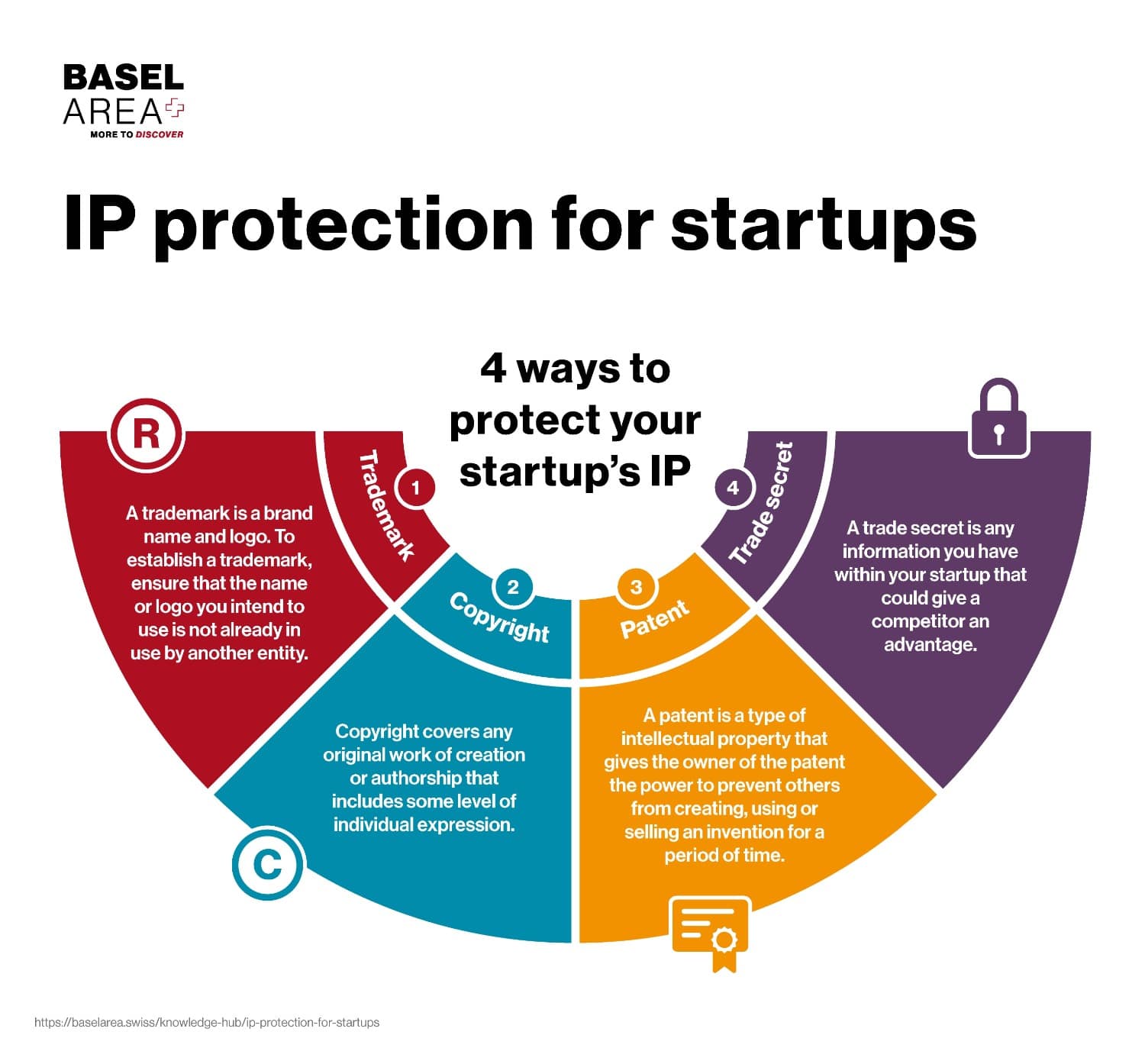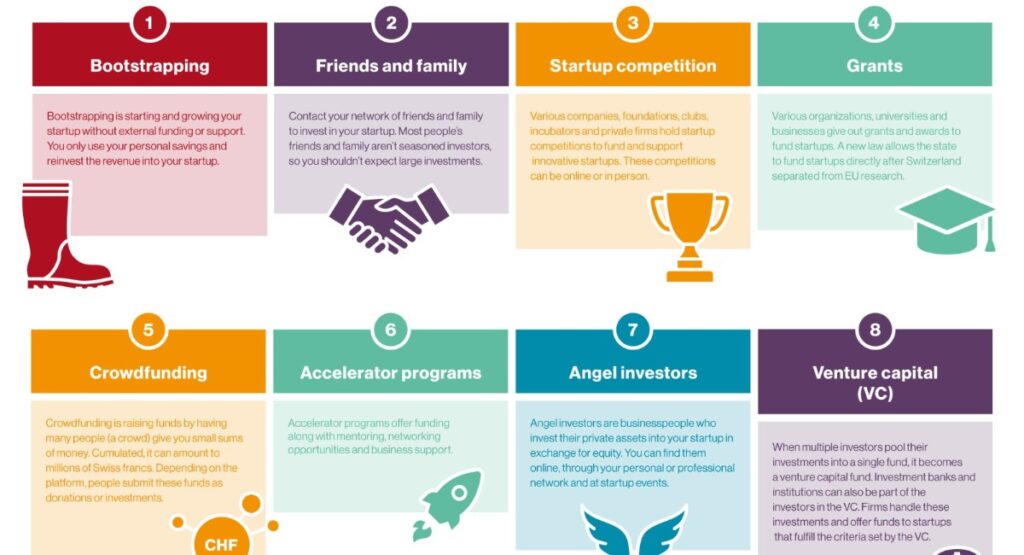
IP protection for startups — 4 ways to protect your business.
Imagine you come up with biotech innovation that could change the world.
You come up with the idea, design a prototype and turn it into a Minimum Viable Product. The business takes off and thousands of customers and hundreds of investors are flocking to you and your product.
Then imagine someone else saying it was their idea. Maybe a contractor, employee or even a competitor. And they attempt to steal your ideas and your business. They very well could succeed if you don’t have the right protection set up for your intellectual property (IP).
In this article, you’ll learn what IP is, when you should and shouldn’t secure it, and four ways to protect your startup’s IP.
What is IP?
IP is short for intellectual property. IP for startups includes the use of trademarks, patents, copyrights and trade secrets.
Startups typically seek protection for different assets like inventions, business names, software and logos.
Depending on the type of IP you’re looking to protect, different methods apply. For instance:
- Trademarks protect a startup’s logo and brand name.
- Patents protect your invention.
- Copyrights protect software.
Protecting your IP is easier in the early startup stages when you’re still laying the groundwork. Once your business takes off and is seeing great levels of success, it’s a lot harder to protect it.
IP protection essentially sets up a shield against your competition.
Think about your business as a castle. Your invention, software or brand is a treasure chest hidden within the castle walls. Without sufficient protection, an enemy army could invade at any time to steal your gold.
IP protection is like building a wall around your castle. It’s a defense strategy you can use to protect your IP and your business. Having one in place can also attract investors, partners, suppliers and customers.
Your IP such as inventions, ideas, software or branding are assets that make your startup more valuable. You should also think of the protection you add to your IP as an asset since it enhances your commercial value.
What can happen without IP protection
If you don’t have an IP protection plan in place, you are leaving yourself vulnerable to infringement claims. We’ve mentioned that someone can come after your business by claiming an idea was theirs if you don’t have IP protection.
There are more risks to not implementing an IP strategy. Here are three ways you could face a potential lawsuit without a proper IP strategy:
You accidentally came up with someone else’s idea:
Imagine you came up with a brilliant idea, created a prototype and even have customers already. If you accidentally infringed on someone else’s patent because you didn’t conduct proper IP research, they could take legal action against you.
You’re selling someone else’s invention:
Another scenario is selling something someone else invented. If someone else created something close enough to your product before you did, you could be at risk of major lawsuits.
You invented something first, but someone protected it first:
You could have been the first to come up with the idea and even invent the product. But, if someone patented your idea before you, you could be the one facing lawsuits.
Failing to set up and follow a proper IP strategy can have dire consequences for your business. And no investor will want to touch a startup without IP protection for its invention. The business you want to build would never take off.
But IP that is truly and legally yours can be a significant source of revenue and new opportunities.
Four important ways to protect your startup’s IP
When building a startup, countless tasks demand your attention. Your IP strategy might not be the first thing that comes to mind. But it’s crucial to protect your business.
Here are four elements you should check when building your IP strategy:
1. Trademark
A brand includes everything that distinguishes your company’s identity from others.
For most companies, these are (at least at the beginning) the company name and logo.
Since you’ve likely put in plenty of time and effort into developing your name and your branding, it’s important to make sure it’s yours.
To set up a trademark, you should start by conducting an online search to make sure someone else isn’t already using your name or your logo. If a name or logo is close to yours but you’re unsure of what to do, it’s best to talk with a lawyer who can confirm your company name and logo are available.
If you have a Swiss business, you can search for available Swiss trademarks at the Swiss Federal Institute of Intellectual Property (IGE IPI).
The IGE IPI has a service that allows you to check for trademarks in various national and international databases.
While you should start by looking for company name trademarks, you will also want to conduct an online search related to your company. Don’t forget to look up your desired company name too: in Switzerland, you can use Central Business Name Index.
If your desired company name is available in your country, your next step is to trademark your business name. Keep in mind, registering your name isn’t a legal requirement but it will provide you with protection from potential legal action.
It can also help defend your brand if you find someone else using your name in their business since you can claim rights to the trademark.
In Switzerland, the cost to file a trademark is CHF 550 which includes three classes of goods and services for 10 years. After a decade, you’ll have to renew your trademark protection for another 10 years for CHF 700.
2. Copyright
Copyright covers any original work of creation or authorship that includes some level of individual expression. It’s the most popular in the music industry. It can also be used in the form of print, lyrics, dance, photography and painting.
In terms of startup companies, copyright can also protect software as it falls under the classification “literary works.”
Wondering what type of IP protection you need to protect your software startup?
A copyright will protect the written code of your software while a patent will protect the concept.
The best part about copyright protection is that you don’t technically have to register to protect yourself. Unlike in other countries, copyright in Switzerland is automatically established once something is created.
3. Patent
A patent is a type of IP that gives the owner of the patent the power to prevent others from creating, using or selling an invention for a fixed length of time. A patent protects new technical solutions, products or processes.
Filing a patent is the longest and most challenging process of IP protection. To start, you must submit detailed examinations of drawings, descriptions or photography of the patent idea. You also need to conduct a deep investigation into the originality of the idea to test how unique it truly is.
The wait time for patents can be long. At the IGE IPI, where you can file for a patent in Switzerland, it typically takes about eighteen months to approve a patent.
The patent application process is typically broken down into four steps:
- Search existing patents (usually with a lawyer) to confirm no one has claimed ownership of your invention.
- File paperwork with your country’s patent registration office.
- The IP organization will let you know whether your idea is patentable or not, or if someone has claimed it already.
- A patent examiner from the IP organization will review your claims and whether it qualifies for a patent.
The costs for filing a patent can vary widely.
Calculate extra budget for a lawyer because you’ll want an expert by your side to set up an IP strategy and to navigate the patent application process.
If you participate in one of our Basel Area programs for startup founders, we will connect you with an IP lawyer.
For innovation in biotech, see BaseLaunch, for innovation in digital health it’s DayOne. If you are looking for entrepreneurial coaching and domain expert advice (e.g. on IP) in any high-tech field, try Venture Mentoring.
4. Trade secret
A trade secret is any information you have within your startup that could give a competitor an advantage. For instance, if someone were to leak specific product or marketing plans to your competition, they could implement your innovation and take market share from your business.
While trade secrets cover a wide range of possibilities, the simple way to combat them leaking is through confidentiality agreements or nondisclosure agreements (NDAs). While you don’t technically need to register your trade secrets for legal protection, an NDA can add even more protection in the event of a legal dispute.
You should use NDAs with a variety of stakeholders including partners, employees, contractors, job candidates, service providers and visitors. Essentially, anyone who can peer into your business should be given an NDA to sign.
But what about NDAs for investors?
In general, everyone – including investors – should sign an NDA before you disclose your ideas with them. While NDAs don’t provide foolproof protection, they serve as a tool to establish confidentiality and demonstrate that certain information should remain confidential. Still, even with an NDA in place, it’s best to disclose sensitive details only on a need-to-know basis.
When not to secure IP.
Is there a scenario that doesn’t require IP protection?
If you want to secure your IP with patents, you should consider your product life cycle, ability to prove infringement, and the potential outcome of legal actions as well as affordability. After all, obtaining a patent may require considerable time and money.
So, if your product becomes outdated very quickly with not even a single element being used in the next generation of products, IP rights other than patents might be better suited.
Also, even if your patents are infringed, there is no guarantee you can find, prove and stop the infringement. Clarify beforehand how infringements can be recognized and whether it is economically worthwhile to enforce your IP against potential infringers. This is particularly important if you want to go international and enforce your patents in different jurisdictions.
Get help protecting your startup!
By protecting your IP with an effective IP strategy, you safeguard your startup against legal action and your business will be more valuable in the eyes of investors.
An IP strategy shouldn’t be developed or implemented alone, though.
If you have a high-tech company and need a lawyer to help you with the process, we recommend contacting our partner, Rentsch & Partner.
We organize an in-person, once-a-year live event that includes lively networking. Also very popular are the IP round tables that we organize every second month that give founders the chance to discuss any questions that they might have in more detail or come up with new questions that hadn’t even occurred to them yet!
To get an update on all our forthcoming events, visit: https://baselarea.swiss/basel-events/.
”For quick answers to complex but important strategic questions on IP or any other topic relevant to startups, take advantage of our Venture Mentoring program and gain quick access to the expertise of the Basel Area startup ecosystem.
Adrian SprengerManager Entrepreneurship at Basel Area Business & Innovation
For example, let our renowned partners Rentsch & Partner and WalderWyss prepare a patentability analysis or a shareholders' agreement specifically for your project, free of charge.
We look forward to hearing from you.


